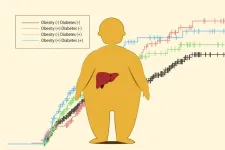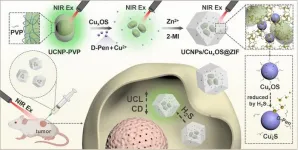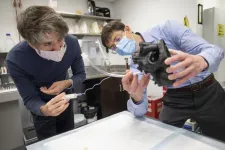(Press-News.org) The legacy of the Soviet Union’s collapse plays a greater role in the foreign policies of Georgia and Ukraine than previous studies have suggested. Conducting foreign policy in former Soviet countries can be a major challenge as the Russian state does not accept the new order. These are the findings outlined in the thesis of political scientist Per Ekman from Uppsala University.
“To understand Russia’s war in Ukraine, for example, it is important to see the war as part of a longer historical event. Since their first day of independence, Georgia and Ukraine have had to deal with Russian ambitions to control the region. For many in the West, it took a long time after the end of the Cold War to realise that a significant part of the Russian political leadership had not let go of the idea of controlling the countries that Moscow ruled during the Soviet era,” explains Per Ekman, doctor of political science at Uppsala University.
The end of the Cold War has often been described as peaceful because it did not lead to a world war. For Georgia and several other Soviet republics, however, the period was far from peaceful, with conflicts in several border regions, including with Russian involvement. In his thesis, Ekman shows how these experiences came to characterise the foreign policy that was subsequently pursued.
In the late 1990s, there was a strong desire in Georgia to create distance from Russia, something which was reinforced after the Rose Revolution in 2003. Russia’s interference in the country’s independence process was perceived by policymakers as highly negative and a main reason behind Georgia losing the conflicts with the breakaway regions of South Ossetia and Abkhazia in the 1990s.
“These early experiences pushed Georgia away from Russia and towards closer cooperation with the US, NATO and the EU, despite Russian protests and the fact that Georgia received no security guarantees from the West,” notes Ekman.
He also posits that Ukraine experienced a completely different situation. Russia certainly put political pressure on Ukraine in negotiations in the 1990s, particularly over the Black Sea Fleet and the Crimean peninsula. Moreover, it took time for the Kremlin to recognise Ukraine’s borders. But the result was seemingly peaceful agreements, which contributed to a significant proportion of Ukraine's decision-makers and population favouring a continued pragmatic relationship with Russia, although they also wanted to cooperate with the EU, the US and to some extent NATO. “There was a minority of Ukrainian politicians who wanted to cut ties with Russia, but the country’s largest party led by the influential Donetsk Network, rejected future Ukrainian membership of NATO and extended the Russian military presence in Crimea in 2010.
“Ukraine’s foreign policy changed monumentally when then-president Viktor Yanukovych rejected the association agreement with the EU, triggering the major Euromaidan protests in 2013. The protests were followed by Russia’s annexation of the Crimean peninsula in 2014. As I show in my thesis, these events resulted in a growing consensus in Ukraine to distance itself from Russia. Paradoxically, the Russian leadership’s behaviour contributed greatly to Ukraine’s increasingly clear move towards the EU and NATO and away from Russia, something Vladimir Putin said he wanted to avoid at all costs,” notes Ekman.
END
How Soviet legacy has influenced foreign policy in Georgia and Ukraine
2024-10-03
ELSE PRESS RELEASES FROM THIS DATE:
Robin Dunbar: Pioneering evolutionary psychologist redefines human social networks
2024-10-03
Oxford, UK – Genomic Press has released a captivating interview with Professor Robin Dunbar, the eminent evolutionary psychologist and anthropologist whose work has fundamentally altered our understanding of human social networks. Published in the Innovators and Ideas section of Genomic Psychiatry, this in-depth conversation offers unique insights into Professor Dunbar's scientific journey and the far-reaching implications of his research.
Professor Dunbar, best known for conceptualizing "Dunbar's number" - the cognitive limit to the number of stable social relationships ...
Balancing health: diabetes and obesity increase risk of liver cancer relapse
2024-10-03
Hepatocellular carcinoma, a type of liver cancer associated with hepatitis infections, is known to have a high recurrence rate after cancer removal. Recent advances in antiviral therapy have reduced the number of patients affected, but obesity and diabetes are factors in hepatocellular carcinoma prevalence. However, these factors’ effects on patient survival and cancer recurrence have been unclear.
To gain insights, Dr. Hiroji Shinkawa’s research team at Osaka Metropolitan University’s Graduate School of Medicine analyzed the relationship between diabetes mellitus, obesity, and postoperative outcomes in 1,644 patients with hepatocellular carcinoma ...
Duke-NUS launches new pictograms to clarify medication instructions, enhancing patient care
2024-10-03
Duke-NUS introduces 35 innovative pictograms to make medication instructions clearer, especially for seniors.
These visual aids are designed to ensure patients take their medications correctly and safely, with the aim of improving overall health outcomes.
The team looks to collaborate with healthcare institutions and pharmacies to standardise pictograms portraying medication instructions across Singapore.
SINGAPORE, 3 OCTOBER 2024 – Transforming patient care through clarity and simplicity, Duke-NUS Medical School has introduced visual aids or pictograms designed to make medication instructions clearer. ...
Chiral nanocomposite for highly selective dual-mode sensing and bioimaging of hydrogen sulfide
2024-10-03
With the continuous development of nanotechnology, more artificial chiral nanomaterials have been constructed. As one of the most representative optical properties of these chiral nanomaterials, CD is a powerful sensing technology. Compared with other analytical methods, CD signal has higher sensitivity, but it cannot achieve in-situ imaging in vivo. Scientists have managed to prepare chiral nanocomposites with more diverse biological functional properties to compensate for this shortcoming. However, some chiral nanocomposites assembled by electrostatic adsorption or other methods are easily dissociated and destroyed in complex physiological environments, resulting in performance ...
UCLA researchers develop new risk scoring system to account for role of chronic illness in post-surgery mortality
2024-10-03
FINDINGS
A UCLA research team has created the Comorbid Operative Risk Evaluation (CORE) score to better account for the role chronic illness plays in patient's risk of mortality after operation, allowing surgeons to adjust to patients’ pre-existing conditions and more easily determine mortality risk.
BACKGROUND
For almost 40 years, researchers have used two tools, the Charlson Comorbidity Index (CCI) and Elixhauser Comorbidity Index (ECI), to measure the impact of existing health conditions on patient outcomes. These tools use ICD codes that are input by medical professionals and billers to account for patient illness. These ...
Mount Sinai BioDesign expands industry collaborations to expedite and enhance the development of innovative surgical technologies
2024-10-02
Mount Sinai Health System today announced that Mount Sinai BioDesign, the medical technology incubator of the Health System, has expanded its reach to become a key, effective partner for the broader MedTech community.
Through synergistic partnerships between clinicians, technologists, and industry partners, Mount Sinai BioDesign is able to offer an array of services, including expert clinical and engineering feedback, preclinical trial development and execution, data gathering and analysis, and pivotal clinical study management. Mount Sinai BioDesign has already established several mature partnerships that have ...
Study reveals limits of using land surface temperature to explain heat hazards in Miami-Dade County
2024-10-02
Study Reveals Limits of Using Land Surface Temperature to Explain Heat Hazards in Miami-Dade County
The findings underscore the importance of further research to enhance our understanding of urban heat dynamics in subtropical and tropical regions, ensuring that heat mitigation efforts are informed by the most accurate data available.
A recent study published in the journal PLOS Climate on October 2, 2024, examines the effectiveness of using land surface temperatures (LSTs) as proxies for ...
The Lancet Public Health: Accelerating actions to eliminate tobacco smoking could help increase life expectancy and prevent millions of premature deaths by 2050, modelling study suggests
2024-10-02
First in-depth forecasts of future worldwide health impacts of smoking reveal potential effects of eliminating smoking on life expectancy and premature deaths by 2050.
Based on current trends, global smoking rates could continue to decrease to 21.1% in males and 4.18% in females by 2050.
Analysis indicates accelerating actions towards the elimination of smoking globally would increase life expectancy and prevent millions of premature deaths, resulting in 876 million fewer years of life lost (YLLs).
Reducing smoking rates to 5% by 2050 would increase life expectancy by one year among males and 0.2 years among females ...
The Lancet Public Health: Banning tobacco sales among young people could prevent 1.2 million lung cancer deaths, global modelling study suggests
2024-10-02
Analysis of the impact on lung cancer deaths of banning tobacco sales in people born between 2006 and 2010 indicates 1.2 million deaths could be avoided.
The findings suggest the creation of a tobacco-free generation could prevent almost half (45.8%) of future lung cancer deaths in men, and around one-third (30.9%) in women, in this birth cohort.
Nearly two-thirds (65.1%) of the deaths averted would be in low- and middle-income countries (LMICs). Close to two-thirds (61.1%) of all lung cancer deaths in high-income countries would be avoided.
Creating a generation of people who never smoke could prevent 1.2 million deaths from lung cancer globally, according ...
One million people who never regularly smoked now vape in England
2024-10-02
The number of adults vaping in England who have never regularly smoked has increased sharply since 2021, when disposable e-cigarettes first became popular, according to a new study by UCL researchers.
The study, published in Lancet Public Health and funded by Cancer Research UK, estimated that, as of April 2024, about one million adults who had never regularly smoked now vaped in England, a sevenfold increase since 2021, with most of them vaping daily and over a sustained period.
This increase was largely driven by young adults, ...








